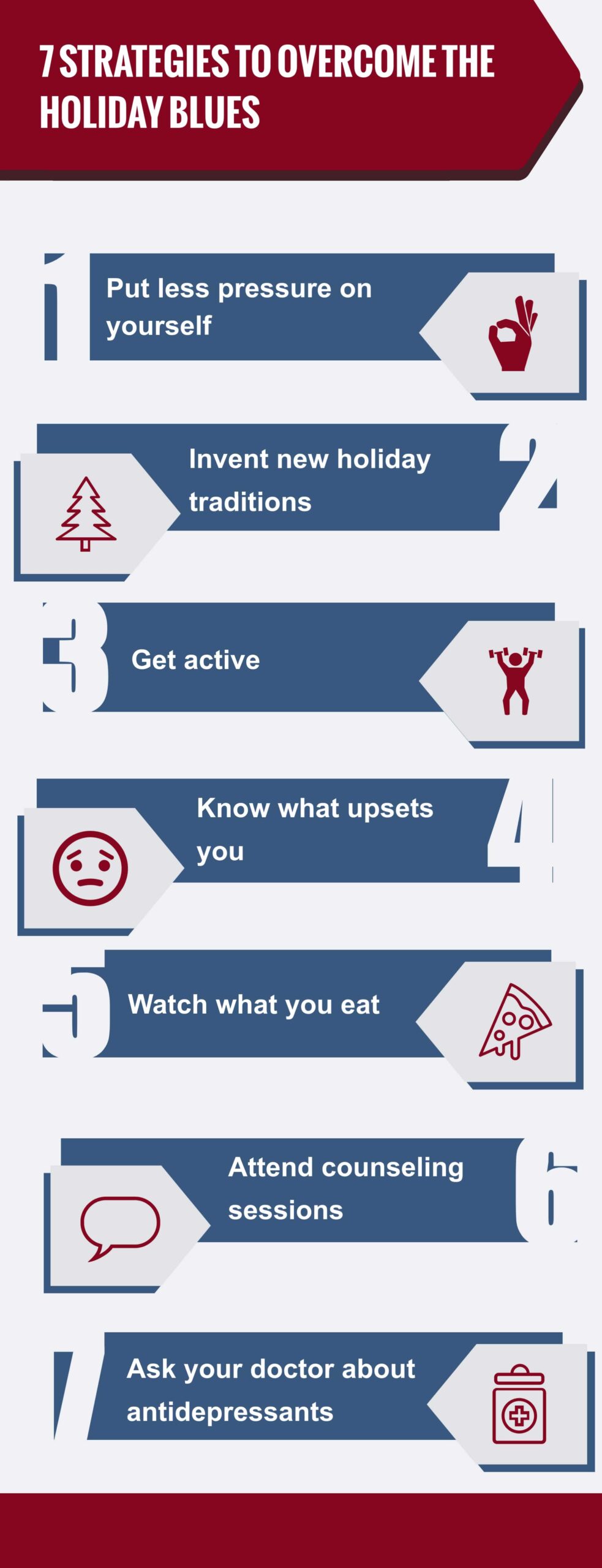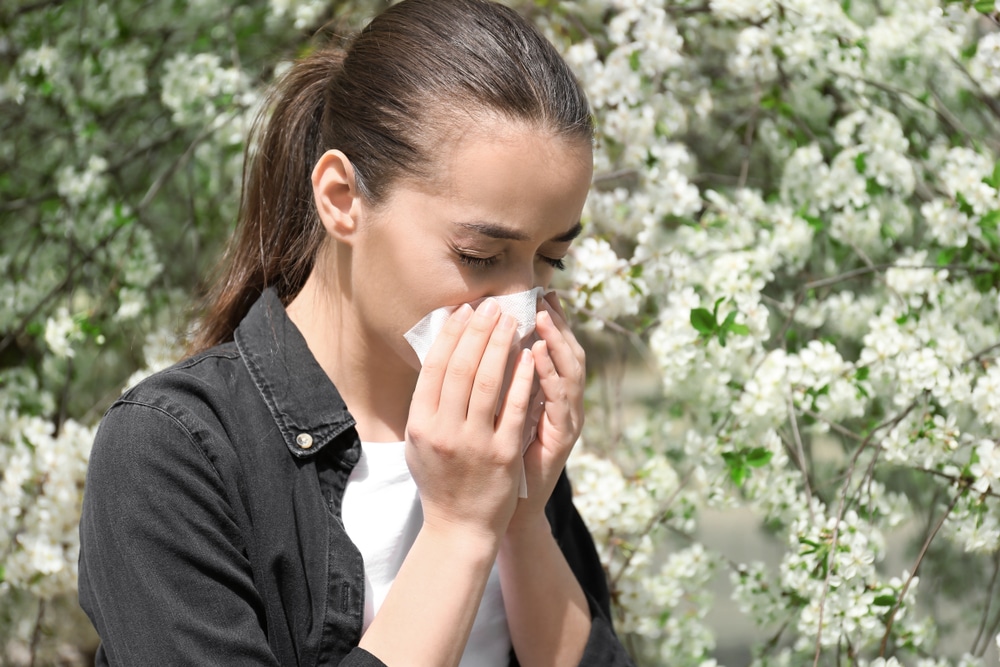Anyone who’s dealt with holiday depression, clinical depression, or both understands that depression is a difficult condition to live with. Even short-term seasonal depression takes a toll. It can be very frustrating to try enjoying the holiday season with your loved ones while you feel emotionally drained and exhausted. Fortunately, victims of the holiday blues have a few effective strategies at their disposal to survive this time of year.

Beating the Holiday Blues
Since everyone is different, what works for one person may not help another deal with the holiday blues. However, these strategies have generally been shown to at least be stepping stones toward a workable solution. Try a few of these treatments to find what works for you:
- Put less pressure on yourself
- Invent new traditions
- Get active
- Know what upsets you
- Watch what you eat
- Counseling
- Antidepressants
1) Put Less Pressure on Yourself
You probably have a lot going on during the Christmas season. Between shopping for gifts, family obligations, attending special events, and potentially volunteering, your to-do list is a mile long and your calendar is full. The stress of all these commitments can build up and take a toll on your sanity.
The best way to avoid this is to keep yourself from overcommitting. Remember, you aren’t required to attend every party or visit every family member. Figure out how many commitments you can handle and stick to that amount. You should never feel obligated to stretch yourself too thin.
2) Invent New Traditions
If you’ve recently lost a loved one or moved away from them, you might miss the yearly traditions you used to have with them. Maybe it’s no longer possible to watch your favorite holiday movie together or go to a particular restaurant. Why not try making up some new traditions? Come up with new yearly activities to do by yourself or with a loved one to give you something new to look forward to. Be creative and enjoy yourself!
Pro Tip: Even if your new holiday tradition is as simple as going for ice cream with your friend or partner, stick to it! You’ll have something personal and special to look forward to every year.
3) Get Active
As cliche as it may sound, one of the best and simplest treatments for feeling sad is to get moving. It may be too cold outside to go for a walk, but try a few simple indoor exercises to get your blood flowing. Even cleaning the house can help. Find a few simple activities to keep you busy.
Additionally, if you can afford the time, consider volunteering for one of the many charity activities that become available during the holiday season. Not only will this be your chance to give back to your community, but it’s also a reason to get out of the house and move around for a while. Something as simple as grocery shopping for a friend or spending a morning at a food pantry can help you stay active and happy.
4) Know What Upsets You
You probably know yourself well enough to know what makes you unhappy. Maybe staying up too late makes you exhausted and grumpy in the morning. Alternatively, maybe a particularly difficult family member causes you to stress every holiday season. Identifying the problem certainly helps. However, it’s only the first step. The next step is taking care to avoid the activities, people, or circumstances that could contribute to your depression.
Of course, that’s easier said than done. You certainly have more control over what time you go to bed than which relatives you see at the family reunion every year. However, you can still exercise some control. Continuing the example of a difficult relative, ask other family members to help you keep away from a difficult person, or go to holiday parties you know they won’t be attending. Don’t feel obligated to associate with them all the time simply because they’re family. Your mental health comes first.
5) Watch What You Eat
Some foods can actually contribute to a poor mood if you eat too much of them at once. While everyone’s body reacts slightly differently, doctors have identified several common culprits that could be bringing your mood down this winter:
- Sugar
- Caffeine
- Artificial sweeteners
- Alcohol
- Pastry desserts
None of these will automatically give you seasonal depression on their own. However, if you eat too much of any of these too often, you’ll probably notice your symptoms worsening or at least not improving. Try making some equally delicious and far healthier comfort food recipes for your holiday parties instead. Your friends will love them, and your body will get what it needs to help you begin to feel better.
6) Counseling
Sometimes, all the self-treatments and preventive steps in the world aren’t enough. There’s nothing wrong with this. After all, people react differently to different circumstances. If you’re still struggling even after taking multiple steps on your own, it’s time to call a doctor for professional help.
One of the most common medical treatments for season depression is counseling or talk therapy. Your doctor will help you analyze your emotions and experiences to find the root cause and work on it. Even if the process takes a long time, a medical professional will work with you as long as you need to help you improve. Getting a diagnosis is the first step you need to take on your road to recovery.
7) Antidepressants
Your doctor may prescribe antidepressants to help you through the winter months. The exact type, dosage, and duration depend entirely on the severity of your symptoms. You may only need an antidepressant for a few months while the risk of seasonal affective disorder (SAD) is at its highest. However, if your doctor suspects you’ll continue to need medication even in the spring, you might remain on antidepressants a little longer.
The key thing to remember is that even if you only need antidepressants temporarily, they can still help you immensely. You should never feel guilty about seeking medical help even for temporary conditions. Your mental and physical health takes priority and your doctor is there to help you. Don’t ever be ashamed of seeking help.
Have a Great Holiday Season!
Like any seasonal illness, holiday depression can come without warning and require significant treatment to overcome. However, dealing with it is not impossible. Remember that just as there’s no shame in visiting a doctor or taking medicine for physical sickness, there’s no shame in doing the same for mental struggles, even season-specific ones. Talk to your doctor about developing a treatment plan to mitigate your symptoms and keep your holidays bright.
For more information on mental health and overcoming the holiday blues, connect with us and schedule an appointment today.




